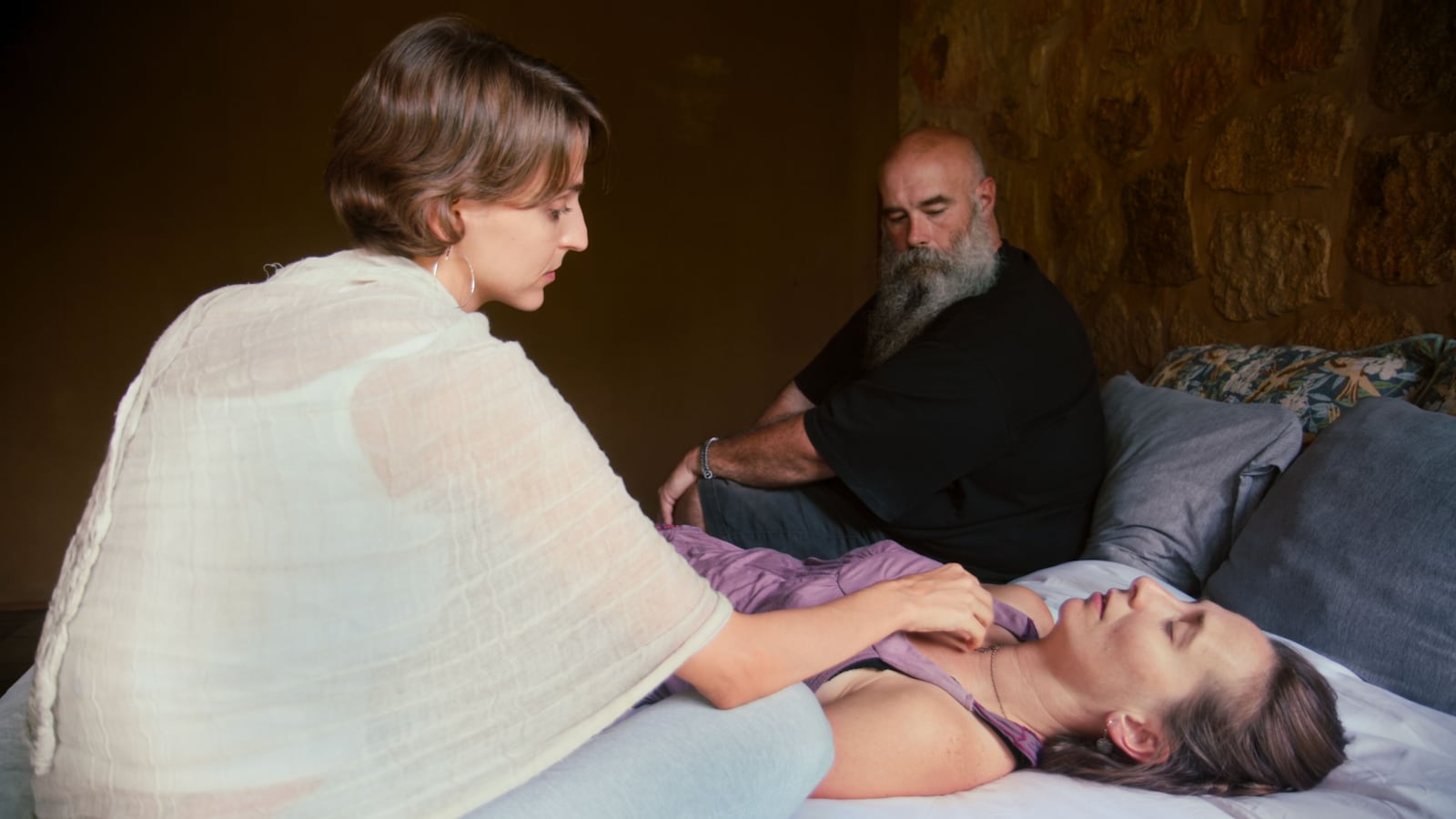The one thing that’s true of every episode of Netflix’s latest docuseries, (Un)Well, is that they’re all too long. As the series explores such contentious topics as essential oils, fasting, ayahuasca, and bee venom, a flood of experts, “experts,” skeptics, and believers drive each episode’s runtime to around 50 minutes instead of the 20 or 30 they deserve.
It would be one thing if all these voices—and the many, many minutes of testimony—arrived at some conclusion. But despite the show’s purported desire to explore whether these lucrative trends are legit or mere junk science, viewers will come away with very few answers.
As much as (Un)Well clearly wants to serve as an even-handed guide into the strange world of wellness, the show’s insistence on letting each side speak for itself without tipping its hand means all it’s really doing is providing a platform for quackery and false hope.
Take, for instance, the show’s first episode, which examines the essential oil industry.
Sure, the episode calls out some bad actors—like Young Living, a multi-level marketing company that has ensnared millions of representatives, very few of whom make the kind of money they desire. But it also cites influencer “Dr. Eric Z” as an essential oil and wellness expert without disclosing that he has, among other things, cited conspiracy theorists in the past and, according to Snopes, previously engaged in at least one marketing scam.
(Un)Well does deserve credit for knowing how to let these “experts” make themselves look bad. At one point Dr. Eric Z gushes about how affordable he and his wife’s master classes are, insisting, “I mean, our most expensive masterclass is $77 dollars for digital access. I mean, anyone can afford that!”
“Even if you’re on food stamps, government assistance—hey, stop drinking Starbucks for two weeks in a row and there’s $75 bucks, right?” he says.
But even the most basic research on some of these guys—as in, just scratching the surface of their Instagrams—can prove alarming. Dr. Eric Z, for example, has spent the past few days fearmongering about 5G and downplaying the severity of the novel coronavirus pandemic.
In one post, he wrote, “Like many of you, I have serious doubts about the ‘pandemic’ data thus far - from what I we can see, this first wave is truly not more deadly than a bad seasonal flu, which kills more than 500,000 people a year, by the way. But... I am legitimately concerned about what will happen to our collective immune system because of this hypersanitation, social distancing and mask wearing nonsense. It makes you wonder if all of this has been part of the play from the beginning...”
Netflix’s first wellness series of the year, Gwyneth Paltrow’s Goop Lab, got pilloried in January for advancing junk science. (Un)Well seems to genuinely want to avoid making that same mistake, but stumbles in its attempts to improve on the formula.
Typically, each episode of (Un)Well will feature a mixture of perspectives without much analysis—leaving it to the viewer to decide whom they believe.
This approach can work in some cases. An episode on breast milk as a dietary supplement for adults, for example, does a decent job of breaking down both why bodybuilders have become fixated on “boob juice,” as one jacked-up bro nauseatingly calls it, while also emphasizing that it is not a totally moral supplement, given the shortages for actual infants and mothers. And episodes about ayahuasca and tantra also both address the cultural appropriation endemic to white people sampling these traditions out of context.
(One quick sidenote about the tantra episode: In a now somewhat ironic twist, it features Michaela Boehm—the intimacy expert whom Will Smith credited in the past with helping save his family.)
But some of these sources’ testimony can be galling, especially when their enterprises have been associated with deadly results.
(Un)Well’s fasting episode is perhaps the most wrenching, as a widow recounts her late husband’s death following a water fast.
According to Lynae Chambers, her husband, Jonathan, had traveled alone to Tanglewood Wellness Center, run by Loren Lockman, to complete an extended water fast. Jonathan had been in consistent contact, Chambers said, and had begun “re-feeding” when one day he apparently stood up during a meal, stripped, and tried to walk outside before attempting to leave the facility. Chambers says Lockman convinced Jonathan to check into a nearby hotel for the night.
“I had no idea that he had just been left at a hotel by himself,” Chambers says. “They came back in the morning and he was gone. They had found him at the bottom of an outdoor set of concrete stairs with severe head trauma.”
“I don’t know what we could have done,” Lockman says. “I mean... I didn’t know anything except that he asked to go. He had been acting a bit crazy but he still seemed sane enough to... I didn’t feel like I had the right to hold him.”
“I don’t think Jonathan’s story has anything to do with extended water fasting,” Lockman adds. “I don’t think he died because he fasted; I don’t think he died because of his re-feeding; I think he died because he hit his head on the floor... We’ve been accused of somehow being responsible for this. I’m not really sure how that's the case.”
Lockman, for those curious, also has some fascinating opinions about COVID-19.
During a recent live Q&A session seemingly posted to YouTube by a third party, Lockman called the flu vaccine a “bad joke” that “does nothing.”
“Coronavirus was engineered... it was released in China,” he added. “The idea was to scare people into submission.”
“The coronavirus is affecting a lot less people than a lot of other things do,” Lockman said, “and it’s nothing to be afraid of because it’s a friggin’ cold virus. So a lot of people are gonna get it. In the same way if you walk into a place of work or a school and someone’s infected with a virus you’re gonna contract the virus. but that doesn’t mean it’s an issue.”
Lockman recommended fasting to increase immune function in the face of the pandemic.
Alongside Lockman, the episode also consults Dr. Alan Goldhamer, who founded TrueNorth Health Center, which oversees medically supervised extended water fasts. We follow one of Goldhamer’s patients, who loses weight and lowers her blood pressure during a 28-day water fast. But without any follow-up to see how her health evened out after she returned to a normal diet, it’s impossible to gauge the efficacy of such methods for long-term health benefits. Displaying this client’s success without any follow-up is irresponsible at best.
The world of wellness will always be resistant to the idea of Western medicine as the be-all, end-all of healing. And (Un)Well at least does a mostly satisfactory job of pointing out how many proprietors of these unorthodox products and approaches somehow always seem to make a whole lot of money off their customers and clients. (In the ayahuasca episode, for instance, the series notes that after a client death an Orlando-based “church” offering ayahuasca cleanses actually raised its price to $600 per session.)
In the end, though, the main trouble with this series is figuring out how to define exploitation. (Un)Well deserves credit for treating the families and patients seen in these episodes, many of whom are at the end of their ropes, with a fair amount of dignity. It would be easy to treat people willing to sting themselves with bees and chug hallucinogenic teas as ignorant victims. This series routinely chooses empathy, but it comes at a price—the show also refuses to state explicitly or even hint that its first-person subjects are being exploited.
In this context, one woman’s testimony stuck out from the rest: Suzanne, who had been using ayahuasca to manage her alcoholism, had a bad experience on camera. After about 20 minutes at Orlando’s Soul Quest Ayahuasca Church of Mother Earth Inc., she has a seizure.
“Looking back at this weekend my initial gut reaction is, ‘What a waste. What’s the point?’” Suzanne says on-camera after being hospitalized. “Why did I cancel my clients? Why did I drive down here just to have about 20 minutes of terror, end up in a hospital, and probably facing I don’t even know how many thousands of dollars in hospital bills?”
“I don’t know if I’ll do aya again,” Suzanne says. “And that’s very disappointing, because I thought aya was my life route. Now I’m not so sure.”



